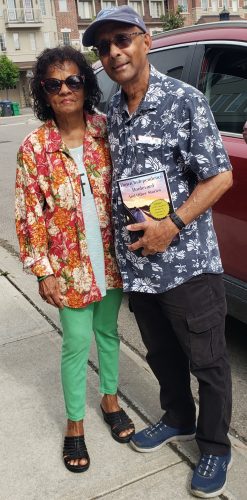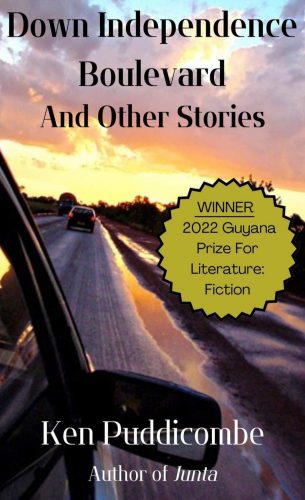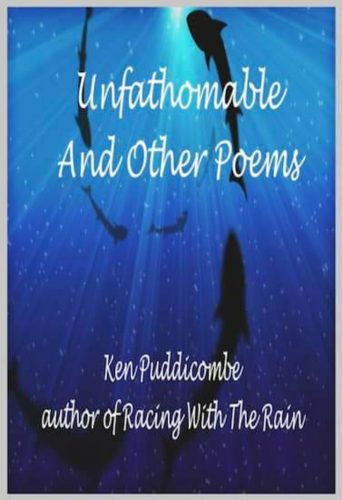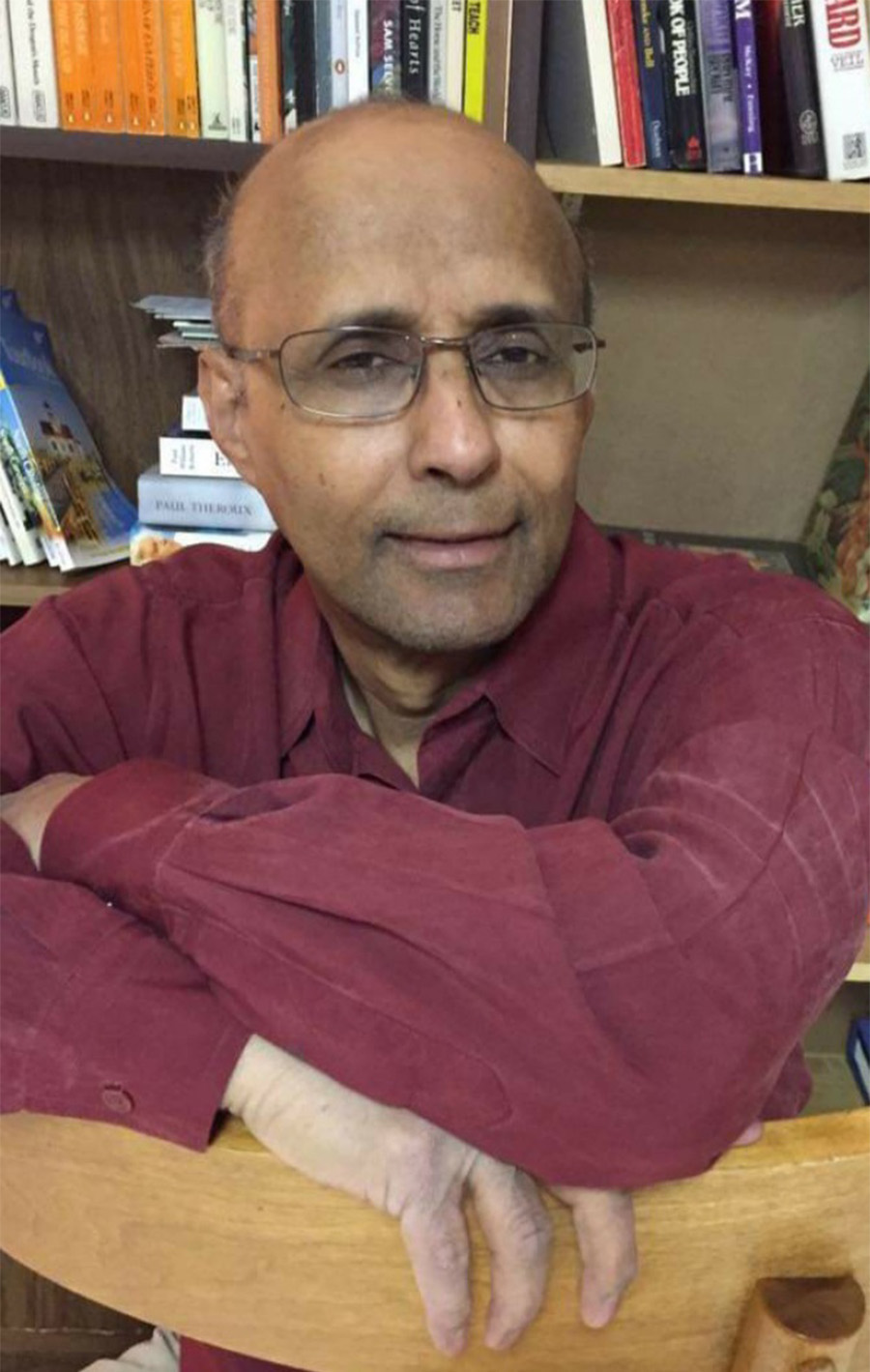Down Independence Boulevard and Other Stories by Guyanese-Canadian writer, poet and publisher Ken Puddicombe, the winning entry in the 2022 Guyana Prize for Literature, Fiction category, is an entertaining and educational work that is one third historical, one third fictional and one third personal experiences, set in Guyana’s immediate pre and post-independence era.
The entry was Puddicombe’s first in the country’s premier literary competition.
“I thought my collection of 16 short stories was ideal for submission because of so many historical references going back to the 1950s, 1960s and 1970s,” Puddicombe told Stabroek Weekend in a recent interview from his Brampton, Ontario, Canada home. He said that he had not heard about the revival of the literary competition until author and poet Ian McDonald telephoned him and advised him to enter. McDonald sent him the details.

“I submitted my entry electronically with one day to spare,” he continued. “I really didn’t think anything further about it until I received an email telling me I was in the running for the prize. What a pleasant surprise that was. I was euphoric to think I was even being considered because I know that Guyana has many qualified, able and well-known writers.”
Puddicombe was not informed he had won the prize in the fiction category but when his ticket was purchased for the awards ceremony by the organisers of the competition, he said, “I had a strong feeling I had won. Why would they pay my expenses to attend the ceremony? The only person I told about my suspicions in my family was my wife because I wanted to be absolutely sure. I had to run around to get a flight for her.”
Puddicombe and his wife arrived in Georgetown the day before the awards ceremony in February this year.
The short stories, set in Guyana, Canada and the USA, are all linked with some characters appearing in more than one.
The book, which, according to USA Today bestselling author Karen Fenech, is an entertaining and poignant work of fiction that also delves into 1960s British Guiana from a perspective of a varied cast of compelling characters, is worth the read.

Among the characters are a taxi driver who sees changes in Independence Boulevard after freedom from Britain, a free-wheeling spirit who spends time gambling and engaging in riots, a man who is sentenced to death for his lover, and a mailman who is caught in the World Trade Center attack.
“It shifts from Guyana to the US and to some parts of Canada where Guyanese migrated. Many of the stories are set during the turbulent years of early 60s including the race riots and the migration of people to different countries and climates,” Puddicombe said. “Certainly it is about some of my life experiences. In writing there is a personal element with almost every writer.”
Down Independence Boulevard and Other Stories was Puddicombe’s third book. It is available on amazon.com in paperback and ebook.
Puddicombe used his experience of the early 1960s and during the ‘1964 Long Strike’ in some of his writings.
“It was during that period when those in opposition to the People’s Progressive Party government instigated a strike to force the government to cave into their demands. It was during that time, when the CIA was involved in the country’s labour and political movement to destabilise the government of Cheddi Jagan,” he stated.
He was working at the Income Tax Department during that period. Civil servants were not on strike and he had some encounters with strikers, whom he saw as racists.
“Let me put it this way, although I am partly White, I look very much East Indian. So you can imagine me being subjected to racism back then in Georgetown during that period. On reflection I can see there were times when I could have been seriously harmed. I guess I wasn’t harmed because of good fortune,” he added.
He remembered some fear while in a car that was driving down High Street, which was besieged by strikers coming from the opposite direction. “However, they moved on and we were safe. My wife also worked at the Income Tax Department during that time. She was practically assaulted on her way out of the GPO building at one time. A good friend saved her. So these things could have been really more disastrous,” he said.

Puddicombe thinks Guyana has come a long way from the 1960s and the race riots, but still has a lot more to go.
“One has to be careful, you don’t expect things to happen overnight. We will get there. Guyana has had at least two new generations since independence and the racial conflicts of the early 1960s and people will be more accepting of each other than the older generations. I would think that the current generation would be a lot more integrated and a lot more open to integration. I’m not saying it’s not so,” he said.
Although he left Guyana over 50 years ago, he still experiences nostalgia. “You can’t take the Guyanese out of me. The times I’ve been back to Guyana have been very evocative. I try to bring my kids up with the knowledge about Guyana. They have been to Guyana a few times.”
Publications
Puddicombe’s first novel, Racing with the Rain, is a historical fiction steeped in the 1960s and 1970s in Guyana. “It also takes you to Cuba. It is semi-autobiographical,” he said. His second, Junta, is set on a fictional island, St Anglia, in the Caribbean where the military starts a coup and takes over the government. That was followed by Down Independence Boulevard.
His fourth book, Unfathomable and Other Poems, which he published two years ago, was submitted for the Guyana Prize for Literature, Poetry. While he enjoys writing poems, Puddicombe said, his love is writing fiction.
He is now working on his fifth book, another historical fiction which is two thirds in the making. “This one is set in Panama during the early 1900s. It has a Guyanese connection. It is about this massive migration of West Indian labour to build the Panama Canal.”
Puddicombe publishes his own books.
“Middle Road Publishers is owned and operated by me. The name comes from Middle Road, La Penitence where I grew up. We’ve published 25 books so far and I do the editing and the publishing. One of my daughters designs the cover. The books range from fiction to nonfiction, poetry, novels, short stories, memoires and anthologies. We publish an average of four a year and we’re working on another four right now,” he said.
Middle Road Publishers is located in Rosedale Village, Brampton. Information can be obtained via www.middleroadpublishers.ca or www.kenpud.wordpress.com
Recommendations
Puddicombe expressed some concerns about the lack of adequate publicity about the Guyana Prize for Literature and suggested that the Ministry of Culture, Youth and Sport promote the competition more widely.
“For example when I heard from Mr Ian McDonald that the competition was back on, I went onto the Ministry of Culture’s website and I couldn’t find any information about it,” he noted. “I did a Google search and came up with something on Facebook but there was no link or information to point me in a direction. I contacted Ian who gave me some contacts and that was how I managed to finally get hold of someone and so enter the competition. The competition was not as effectively advertised as it should have been. I suggested the ministry create a list of contacts that writers or individuals interested in the competition could contact. It is encouraging that the competition is now back in vogue.”
He suggested there should also be more emphasis on planning for the awards ceremony and to make travel easier for likely winners.
“At one time I was dealing with no more than four different people in trying to finalise my trip to Guyana. Finally, I got hold of Al Creighton. I telephoned him and his reaction was, ‘Wait, you haven’t got any information on your flight?’ I said, ‘No.’ This was like a couple of days before the awards ceremony. Nobody was taking responsibility for the programme in terms of passing information to the people who needed it. That would be my main concern right now.”
He noted too that the public should be made aware of the readings by the winners. “The poor turnout for the reading had to do with the lack of publicity. The media had not been well informed,” he said.
Background
Kenneth Puddicombe was born in Middle Road, La Penitence, which in the mid-1900s was not a part of Georgetown. It was called La Penitence Village. His parents were Guyanese with his father being of English heritage, hence the name Puddicombe. His mother was East Indian whose grandparents came from India to then British Guiana through indentureship.
Puddicombe drew inspiration for his reading and writing from his father, who, after retiring early from his job, owned and operated two book stalls in Stabroek Market. His father was an avid reader.
“Books were readily available to me and you can see who inspired me to read and write. In those days I was also a frequent borrower of books from the Carnegie Library [now the National Library].”
He was always interested in the writings of Guyanese and Caribbean authors and has read many of their works. “I followed them. I read them. I studied and looked at their approach in writing.
“One day, many years ago I was on a trip to Northern Ontario and I stopped at a shopping mall. Books were on sale in a display there and what did I come across? The book, My Bones and My Flute by Edgar Mittelholzer. I snatched it up and asked myself, what would a book by Mittelholzer be doing all the way up in Northern Ontario? I still have it in my collection.”
Prior to this interview, Puddicombe said, he was reflecting on his first attempt at writing a thriller during his early teens. “I started typing it on a Royal typewriter. Sad to say I didn’t keep it and I cannot even remember the title of my book. It was based on the books I read, an active mind and my love of the cinema.”
Puddicombe had his secondary education at Indian Educational Trust College, now Richard Ishmael Secondary School in Woolford Avenue. After leaving high school he taught for a short while at Central Preparatory School in Smythe Street, Georgetown which prepared pupils for the then Central High School.
He later joined the civil service at the Income Tax Department which was then located in the Guyana Post Office Corporation building in downtown Georgetown.
“I worked there for six years. Got married and then my wife and I left the country in 1970. Here we are in Canada today,” he related.
When he left Guyana, Puddicombe, the father of two daughters, was concerned about the political situation in the country. “At that time we had our first child who was born in 1969. My daughter was a year old at the time and we wanted to provide a safer and better life for her. Also, it should be noted that I come from a large family. I have seven siblings and a few of them were already in Canada before me so the impetus and attraction were already here. Again I’m saying one wants a better life for your children, right? Not to constantly be looking over your shoulder to see what is happening and feel exposed.”
Nevertheless, he said, “I have never given up on Guyana. The nostalgia is there. I still have some distant relatives and quite a number of good friends there. However, I always say home is where your family is. I have my two daughters here. I have my two grandkids here. My extended family is here and while I still feel very deeply for Guyana, this is where home is.”
In Canada, Puddicombe studied accountancy and became a certified public accountant. “I worked for a number of different companies here. I took an early retirement and decided to go back to my love of writing seeing that I am still going strong.”







